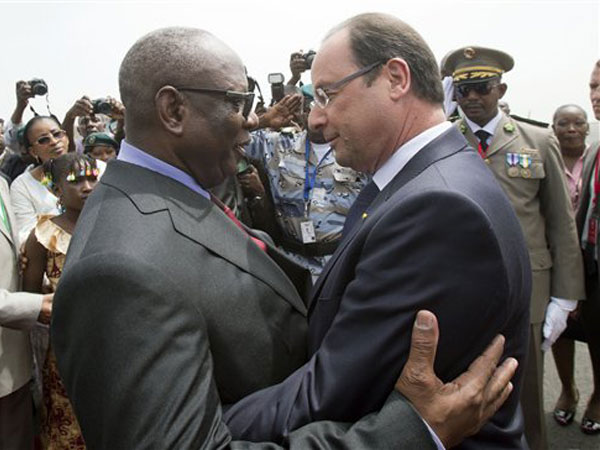
Mali’s new president Ibrahim Boubacar Keita, left, welcomes France’s President Francois Hollande, right, at Bamako airport, Mali, Thursday, Sept. 19, 2013. Hollande declared Thursday that the war on terror had been won in the West African nation of Mali, listing the towns that French and Malian troops liberated from al-Qaida’s local fighters earlier this year. AP
BAMAKO – Four suicide bombers blew themselves up at an army barracks in northern Mali on Saturday, killing two civilians in an upsurge in violence against the military since the failure of peace talks with rebel groups.
The bombers let off explosives in a car in front of an army camp in the desert city of Timbuktu, also wounding six soldiers, the government said, just 24 hours after troops in the rebel bastion of Kidal were hurt in a grenade attack.
“The government strongly condemns the suicide bombing… by four terrorists at the military camp in the city of Timbuktu,” it said in a statement.
“This cowardly attack resulted in the death of six people, including two civilians and four terrorists who were killed on the spot. The explosion resulted in extensive damage.”
An African military source from the United Nations’ MINUSMA peacekeeping mission confirmed the attack, the first suicide bombing in the mainly Tuareg and Arab northern fabled caravan town since March.
Mali has been the target of a series of attacks claimed by Islamist insurgents since France launched a military operation in January against Al-Qaeda-linked groups occupying the north of the country.
The French-led operation forced the extremists from the cities they seized in the chaotic aftermath of a military coup that overthrew Mali’s government in March 2012.
Residual groups of these fighters are no longer able to carry out coordinated assaults, but are still capable of regular small-scale attacks, mainly against Malian and French soldiers.
On March 21, a suicide bomber blew up a car near the Timbuktu airport at the start of an overnight assault on the city, killing a Malian soldier.
Saturday’s attack came a day after two men threw hand-grenades at Malian troops in the ethnic-Tuareg northern town of Kidal, wounding two soldiers.
The incidents follow the suspension of peace talks on Thursday between Tuareg and Arab rebels who want autonomy for northern Mali and the government.
The government urged Malians to remain calm, saying security was being enhanced across the country.
“The multiplication of these attacks shows that the war against terrorism is not over and that the security situation remains fragile throughout the Sahel-Saharan region,” it said.
MINUSMA chief Bert Koenders said the peacekeeping mission would “continue to support the Malian people and authorities in restoring peace and stability in the entire country.”
The Tuareg National Movement for the Liberation of Azawad (MNLA) took control of Kidal in February after the French-led military operation ousted Al-Qaeda-linked fighters who had piggybacked on the latest Tuareg rebellion to seize most of northern Mali.
The Al-Qaeda-backed militants had chased out their former MNLA allies and imposed a brutal form of Islamic law.
The Malian authorities reclaimed the city after signing a ceasefire deal with the MNLA in June but the situation has remained tense.
The June 18 Ouagadougou accord between the rebels and the government allowed the Mali military to return to Kidal to prepare the way for presidential elections in July which brought Ibrahim Boubacar Keita to power.
Under the deal signed in Burkina Faso, the government and rebels agreed to respect the country’s territorial integrity and to hold peace talks, focused on the status of northern Mali, which the Tuareg movements call Azawad.
But the rebels said on Thursday the government had not kept to its commitment under the deal to start prisoner releases, and announced they were pulling out.
The central government is unwilling to discuss autonomy for northern Mali and there have been sporadic clashes between Malian troops and local populations in the desert region since the deal was signed.